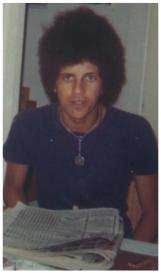
After
30-years performing Evan Silva is still New Zealand's Motown man and
his album Gotta Get Up, released at the turn of the
millennium, is testimony his voice and songwriting have continued to
mature.
Evan Silva was born in Mission Bay, Auckland in 1947
of Portuguese, Pacific Island and French descent. As a teenager his
skill as a musician and performer were quickly recognised after an
uncle took him along to a club on the North Shore where he ended up
making his debut at the age of 13-years.
By the time he was
16 he joined his first band known as The Mockers with some teenage
friends who played through the Christmas period at the huge Orewa
dances. However plans to take on lucrative weekend gigs were stifled
when Silva, who had something of a short fuse, came to the notice
of the law.
Juvenille
hi-jinx
He'd been hanging out with a tough crowd and
after a several assaults, mostly on those much larger than him, he
was given six months of periodic detention. In those days young
offenders spent the entire 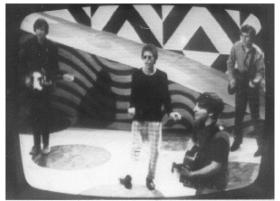 weekend under the watchful eyes of
overseers where their frustrations were worked out behind a
shovel. weekend under the watchful eyes of
overseers where their frustrations were worked out behind a
shovel.
That six months cooling off helped Silva decide once and for all
that music was going to become the key focus in his life not hooning
around with the bad crowd. He kept himself to himself, playing
weeknight performances with his own band which renamed themselves
Nobody's Children.
This unit was one of Auckland's first
full-on soul bands playing hard edged Wilson Picket songs including
99 1/2, Midnight Hour , Don't Fight It and 6,3,4,5,7,8,9.
The band was sought after for its hot
sound and tight playing despite the fact Silva was often so nervous
he would sing with his back to the
crowd.
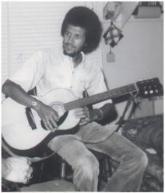 Nobody's Children played top Auckland venues The
Galaxie and the Top 20 in Durham Lane in the mid-60s. Nobody's Children played top Auckland venues The
Galaxie and the Top 20 in Durham Lane in the mid-60s.
Action full time
While performing at the Top 20 club in 1966 Evan
met up with bass player Jack Stradwick who asked him to join his
recently formed group The Action. Silva replaced Jack's brother Danny
who had decided to leave.
The band had been formed earlier in 1966 featuring
Jack Stradwick on bass, Brian Harris on drums, John Bissett on
keyboards and John Kristian on guitar.
At long last Silva
was able to realise his dream of becoming a full time
musician. The Action was New Zealand's answer to the Tamla
Motown sound with a tight rhythmic feel and classic soul
harmonies.
The Action were
resident at the Top 20 Club and then The Galaxie where they
regularly drew full houses .They toured heartland New Zealand and
recorded four singles on the Zodiac label - all of which made
chart appearances. (name the songs) The band was a regular on Pete Sinclair's
C'Mon
TV show. Most of the time Evan admits he was drunk on Lemon Gin,
'the flavour of the year'.
The Sydney
scene
 The Action headed across the Tasman in late 1967. The first
gig in Sydney was at Whiskey a Go Go alongside resident artists
Billy Thorpe and the Aztecs. The first spot the band played they received
a rave
reception from the American GI's on R&R from the Vietnam war.
They loved the Motown, soul sounds. The Action headed across the Tasman in late 1967. The first
gig in Sydney was at Whiskey a Go Go alongside resident artists
Billy Thorpe and the Aztecs. The first spot the band played they received
a rave
reception from the American GI's on R&R from the Vietnam war.
They loved the Motown, soul sounds.
The band was immediately
signed for a 12 month residency at a club called The Hawaiian Eye in
Sydney which was extended another year. They appeared on the top rated Australian TV show
Bandstand.
The Action had taken up lodgings in
King's Cross with Sydney's seamy underworld of dope and prostitution
all around them. There were parties every night, and drugs were a
staple diet. Evan recalls the consequences of those heady days
included the death of a number of friends and others who never
regained their right mind.
The stresses of working together
for two solid years began to tell as tension grew between
members of The Action. By late 1968 Jack Stradwick and new guitarist
John Kristian quit so Silva got in touch with Mike Wilson and Gus
Fenwick of The Apple to come over from New Zealand to keep the
residency. Drummer Brett Neilson was the next to leave - being replaced for a time by Wellington drummer
Andy
Anderson.
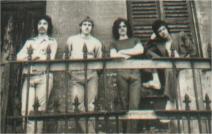 Wild
antics Wild
antics
Evan recalls Anderson often played The
Hawaiian Eye with a staff meal sitting on his tom tom drum so he
could pick away at the food in-between songs. When the band was
playing however Evan says he'd often look over and see gravy and
peas vibrating off the plate onto the floor.
On another
occasion Anderson turned up late for a gig without his drumsticks.
Just before the set he raced off down the road to the grounds of the
Sydney Court House, climbed a tree and came back with two thin green
branches. He used these to pound his drums for the rest of the night
with the sap spraying into the audience and band
members.
The band appeared in the TV soap opera Bell
Bird and the movie The Vision, however band members barely
remember their on-screen appearances. Within a year of the third line-up change
it was all over for The Action. The players had pushed themselves
and each
other to the limits - it was time for something new. 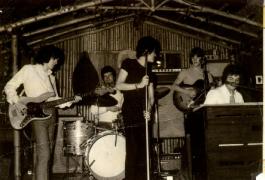
Silva put together a short
term band with Wilson and Fenwick doing the club scene on Sydney's
North Shore. After that he joined forces with popular Melbourne band
Compulsion - formed from top Kiwi band Sounds Unlimited. Band
members all had large afro hair styles and were
making an impact on the Australian scene playing
Hendrix and Joe Cocker covers. The unit played all the Melbourne
clubs including the Thumping Tum, Berties and Sebastians.
Compulsive
behaviour
Out of Compulsion Silva and Tehei formed
another short-lived unit known as Total Abstainers, which was
approached to be the resident band for the rock musical Hair. This
didn't happen so the band broke up with Tehei going on to join the
remnant of another 60s Kiwi band The Castaways.
Silva and
Stradwick formed progressive blues-rock band Hamul financed by a
successful businessman. They ended up playing in Melbourne then
moving to Sydney where the unit was resident at the Condor Room for
about six months then at The Groovy Room in Paddington.
Back in New Zealand in about 1970 Jack Stradwick went on to become a founding
member of Tommy Adderley's Headband. Silva and Mike
Wilson also returned home and in 1971 formed The Truth, which played a
six-month residency at the Montemarte before folding. Silva then put
together an eight-piece band called Kindred Spirit playing Sly &
the Family Stone and Edgar Winter material in clubs throughout
Auckland.
Evan Silva admits
he had become "an arrogant, hard-hearted individual". He was
experiencing a deep sense of disappointment with his music, his life
and everything else. Then in 1973 something happened that was 'so
out of the blue' that it deeply challenged many of his friends
and 'enemies'.
Hard heart to
Pastor
Profound changes began occurring in Silva's life
are he made a Christian commitment. The hard edges soon to fade and
he experienced a complete turnaround in his attitude. 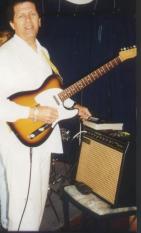 He and his
wife Carol joined a new church that had just started up in West
Auckland along with about 25 others. He began to study the
Bible and receive new revelations about the real meaning of his life
and how he could become a renewed person. He and his
wife Carol joined a new church that had just started up in West
Auckland along with about 25 others. He began to study the
Bible and receive new revelations about the real meaning of his life
and how he could become a renewed person.
He began to
work in the studio doing vocals for many TV and radio jingles
including McDonald's, KFC and Woolworths. This was his forte for
about seven years .
Evan and Carol were becoming
stronger in their newfound Christian faith and were looking to get
more involved. They moved their family to Lower Hutt and started a church there.
That was so successful they found another location where they
believed they were to create an environment for people to come and
hear the gospel.
During
their time in the Wellington Evan
recorded three albums of songs that strongly reflected his new
belief system. Evan and former sidekick Jack Stradwick had both
become pastors and
collaborated on two gospel tapes Will It Be Gold and to To Bring
Glory in the 70s early 80s. Evan drove from Wellington to
Auckland to record over a weekend then back again to the capital
city to preach.
Just as it was when he was on stage with the Action,
Evan was outspoken and determined to let people know 'the message' -
only this time it wasn't soul music it was spiritual sustenance for
the soul.
He recalls one instance where he was invited to sing at a huge
Communist rally in central Wellington. He sang There is a Cross,
Faith Pleases God and the worship song Worthy Art Thou
from his 1983 album Will it Be Gold. The reaction was
predictably hostile.
He returned to Auckland in late 1990 to
start another church, this time on Auckland's North Shore. Harbour
Christian City Church had its beginnings in a pub but grew so
quickly the congregation needed a venue of its own.
They converted an old warehouse
in Barry's Point Rd, Takapuna creating a cafe style ambience. HCCC has been operating for over a decade now
and has a broad section of the community as church goers including musicians,
creative types and other 'unchurched'
people. HCCC regularly hosts regular cafe nights where jazz and blues artists
perform and where artists show their creations.
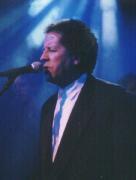 Action
becomes ReAction Action
becomes ReAction
It was from this base that Evan kicked off his
re-emergence into the music industry forming ReAction, initially
featuring Ronald La Praed the one-time Commodores bass player who
now lives in New Zealand. They played corporate functions, Christmas
in the Park and the Galaxie nightclub reunion. They also helped kick off
the launch of music history book Hostage to the Beat.
In 1996 Evan went into The Lab studio with ReAction and
other musicians to record
the CD Ain't No Two Ways About It. The album engineered and
mixed by Larry Killip, featured Jack Stradwick on bass, John Olding and Eddie Pausma on guitars, Denis
Winters on drums, Trevor King on keyboards, Bruce French on
saxophone and Sarah McBride and Vanessa Stradwick on background vocals.
The title track Aint no Two Ways About It
recalls his time in Sydney playing the Hawaiian Eye in 1968 when
he recalls a fan jumping on stage and preaching about Jesus Christ.
This infuriated Silva who 'made him pay'. However that event stuck
with him making his realise his own volatile personality. These days
he knows it is Christ who has paid the price to bring him from that old
life - 'aint no two ways about it!'.
"Ain't No Two Ways About It is a
reflection of my last 30-years - from the roots of my Motown
influence - Otis Redding, Al Green and the Four Tops - to my
spiritual experience. I have written songs around nights of remembrance
in
Sydney playing the Hawaiian Eye in 1969, those events are an
inspiration for the title song. Love Sweet Love is about people
acting with ulterior motives. Mercy Street was written at 1am about
a street light in Mercy St. The very cool jazz You Are my Rock is
therapeutic. There is some blues in there but nobody wants to stay
blue, so the lyrics are about being picked up," says Evan.
Awards,
media mentions and airplay
The album attracted considerable media
attention largely because of Evan's distinguished history in rhythm
'n blues music in New Zealand and Australia and the curiosity about
his conversion to Christianity.
In 1997 Aint No Two Ways About It was a finalist in the clear
Music Awards. In 1998 TV3 Nightline news host Alex DeJong visited
the church to film a Sunday service and to interview Evan - this
went to air on the 10.30 news.
ATV news presenter Paul Hobbs also contacted Evan and came to film
and interview Evan about his music and the church - the item
appeared on the 5.30pm news.
Radio New Zealand's Lisa Owen attended a service recording Evan and
the congregation to put to air.
Evan appeared on the Good Morning TV show answering questions
and performing I Will Cry Out.
Cool Blue (96.10FM) a secular jazz/blues continuous music radio
station in Auckland has play-listed I Say Father from the Aint
No Two Ways About It album.
Leighton Smith New Zealand's popular IZB talkback show host received
a copy of Aint No Two Ways About It. He listened to it and loved it,
concluding Evan must be a black American. He was amazed when he
discovered Evan was in fact a New Zealander and decided to run a
radio competition for listeners to guess the artist. The phone calls
revealed a diversity of guesses from Phil Collins to Stevie Wonder
and Eric Clapton. When Evan called to thank Leighton for the
airplay, the producer of the show put him live to air and he was
interviewed about his life and Leighton asked him to give a full
account of his conversion to Christianity.
Since then Leighton has put out a compilation
with Warner Music called Makin' Whoopee. The song Sweet
Love from Aint No Two Ways About It is included along
with tracks from Dr John, Willie Nelson, Ray Charles, Little river
Band and others. Leighton publicly declared Evan's music to be of international
standard and deserving of greater recognition.
Later that year Evan was interviewed live on
air for an hour from the UK by CrossRhythms Network who originated
the phrase Kiwi Soul Man in their magazine review of his music. Most
tracks off Ain't No Two Ways About It were played on this
station and Love Sweet Love was again selected for a CrossRhythms
compilation album. On Good Friday 2001 Evan was invited back into
the ZB studios for the station's nationwide Easter Show to tell the
story of the impact God has had on his life.
Evan and Carol Silva are committed to
the vision of fostering and adopting children with first hand
experience in this field. in 1999 Evan wrote the theme song for Open
Home Foundation entitled You Make The difference. This song was
released on a special CD Song for the Children recorded for
the inaugural annual Open Home Foundation fundraising concert. it
also featured Steve Apirana, Lole and the Popular Auckland Pacific
Choir.
Back in the
studio
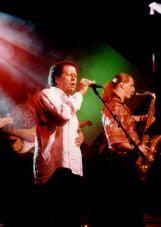 Evan's seventh and most recent CD is a sophisticated soulful album recorded at HCCC in early 2000. Among
the key players is old band-mate Jack Stradwick plus Denis Winters
on drums, Trevor King on keyboards, Steve Summers on guitar and
Chris Mason-Battley on saxophone. Evan's seventh and most recent CD is a sophisticated soulful album recorded at HCCC in early 2000. Among
the key players is old band-mate Jack Stradwick plus Denis Winters
on drums, Trevor King on keyboards, Steve Summers on guitar and
Chris Mason-Battley on saxophone.
The CD contains a selection of brand new songs
recorded live with invited guests, family and friends. The
recording took place over two special Cafe evenings to a full house.
the album Gotta Get Up has funky rhythm 'n blues and soul
grooves with up-tempo Latin feels which Evan attributes to his
Portuguese roots. The album is introduced by Leighton Smith.
Got to Get Up was nominated for the
2001 NZ Music Awards Gospel Section. The stand out song Send Me
An Angel is now being recorded in Denmark by a secular artist.
Auckland-based jazz singer Caitlin Smith reviewed Gotta Get Up
for NZ Music Magazine headlined "NZ Reformed Bad Boy -
our very own Al Green". Caitlin wrote in the Feb/March 2001
issue "the production is slick and warm...this album is
testament to Evan's singing strength."
Listen to Evan Silva's sounds and you'll realise
he's a world class act and his music is an essential addition to
those who love meaningful melodic tunes which get your feet moving
and speak to the heart. 
Information for this article was gleaned
from Hostage to The Beat - The Auckland Scene 1955-1970
By Roger Watkins, research by Keith Newman and Melanie Chandler-Winters and from
conversations with Evan Silva.  Click through to Evan's
Jukebox (MP3 files)
Click through to Evan's
Jukebox (MP3 files)
|